Integrated Manned Programme: Difference between revisions
imported>Graham2001 m (→References: Transferred lunar base references to Moonbase page.) |
imported>Graham2001 (Added details on a planned space shuttle.) |
||
| Line 15: | Line 15: | ||
They were to be launched into orbit either by using a Space Shuttle and Saturn INT-21 to send it up as components to be assembled in orbit, or by using an Saturn INT-21 to place the entire spacecraft in Earth orbit. | They were to be launched into orbit either by using a Space Shuttle and Saturn INT-21 to send it up as components to be assembled in orbit, or by using an Saturn INT-21 to place the entire spacecraft in Earth orbit. | ||
See: | |||
* [http://ntrs.nasa.gov/archive/nasa/casi.ntrs.nasa.gov/19710018484_1971018484.pdf Nuclear Shuttle System Definition Study. Phase III, Volume 1 Executive Summary] | |||
* [http://ntrs.nasa.gov/archive/nasa/casi.ntrs.nasa.gov/19770068980_1977068980.pdf Nuclear Shuttle System Definition Study. Phase III, Volume 2 Concept and feasibility analysis. Part A Class 1 Hybrid RNS. Book 1 System analysis and operations] | |||
* [http://ntrs.nasa.gov/archive/nasa/casi.ntrs.nasa.gov/19770070117_1977070117.pdf Nuclear Shuttle System Definition Study. Phase III, volume 2 Concept and feasibility analysis. Part A Class 1 Hybrid RNS. Book 2 System definition] | |||
* [http://ntrs.nasa.gov/archive/nasa/casi.ntrs.nasa.gov/19710018486_1971018486.pdf Nuclear Shuttle System Definition Study. Phase III, Volume 7 - RNS project requirements] | |||
<br clear="right"> | |||
==Space Shuttle (ILRVS)== | |||
[[Image:ILRVS-Carrier.png|thumb|right|ILRVS Booster Stage]] | |||
[[Image:ILRVS-Orbiter.png|thumb|right|ILRVS Orbiter Stage]] | |||
[[Image:ILRVS-Orbital Flight Profile.png|thumb|right|ILRVS Typical Flight Profile]] | |||
Another 'backbone' of the Integrated Manned Program was the Space Shuttle, a fully or parially reusable spacecraft designed to carry men and equipment to the various low Earth orbit spacestations that would be built as the program got under way. | |||
Several different designs were considered before settling on the one currently being phased out. One such design was one proposed by McDonnell Douglas in which an enlarged HL-10 lifing body would be used to carry a 11,000kg (25,000lb), 4.6m(15ft) by 9.1m (30ft) payload into an orbit with a maximum altitude of 500km (270nm). | |||
Called the Integrated Launch and Reentry Vehicle System (ILRVS), the shuttle and its two man crew would have been launched into orbit using a manned booster stage. | |||
See: | |||
* [http://ntrs.nasa.gov/archive/nasa/casi.ntrs.nasa.gov/19700005908_1970005908.pdf Integral Launch and Reentry Vehicle System. Executive Summary Report] | |||
* [http://ntrs.nasa.gov/archive/nasa/casi.ntrs.nasa.gov/19700005884_1970005884.pdf Integral Launch And Reentry Vehicle System. Vol. 1, Configuration Design and Subsystems. Bk. 1] | |||
* [http://ntrs.nasa.gov/archive/nasa/casi.ntrs.nasa.gov/19700005887_1970005887.pdf Integral Launch and Reentry Vehicle System. Vol. 2, Performance, Aerodynamics, Mission and Operations.] | |||
* [http://ntrs.nasa.gov/archive/nasa/casi.ntrs.nasa.gov/19700022513_1970022513.pdf Integral Launch and Reentry Vehicle System. Vol. 2, Technology Identification Final Report] | |||
* [http://ntrs.nasa.gov/archive/nasa/casi.ntrs.nasa.gov/19700005886_1970005886.pdf Integral Launch and Reentry Vehicle System Vol. 3, Plans, Costs, Schedules, Technologies.] | |||
* [http://ntrs.nasa.gov/archive/nasa/casi.ntrs.nasa.gov/19740077882_1974077882.pdf Integral Launch and Reentry Vehicle System Vol. 4, One and a half stage configurations.] | |||
* [http://ntrs.nasa.gov/archive/nasa/casi.ntrs.nasa.gov/19850069282_1985069282.pdf Integral Launch and Reentry Vehicle System. Final Oral Report] | |||
<br clear="right"> | <br clear="right"> | ||
| Line 31: | Line 70: | ||
* Boeing, ''[http://ntrs.nasa.gov/archive/nasa/casi.ntrs.nasa.gov/19680009778_1968009778.pdf Integrated Manned Interplanetary Spacecraft Concept Definition, Final Report Vol.6, Cost Effective Subsystem Selection & Evolutionary Development]'', January, 1968 | * Boeing, ''[http://ntrs.nasa.gov/archive/nasa/casi.ntrs.nasa.gov/19680009778_1968009778.pdf Integrated Manned Interplanetary Spacecraft Concept Definition, Final Report Vol.6, Cost Effective Subsystem Selection & Evolutionary Development]'', January, 1968 | ||
* J.P. Downs, W.B Thompson, ''[http://ntrs.nasa.gov/archive/nasa/casi.ntrs.nasa.gov/19790072308_1979072308.pdf A Feasible Planetary Exploration Program Through 1980]'', February 26, 1968 | * J.P. Downs, W.B Thompson, ''[http://ntrs.nasa.gov/archive/nasa/casi.ntrs.nasa.gov/19790072308_1979072308.pdf A Feasible Planetary Exploration Program Through 1980]'', February 26, 1968 | ||
* ''[http://ntrs.nasa.gov/archive/nasa/casi.ntrs.nasa.gov/19700005908_1970005908.pdf Integral Launch and Reentry Vehicle System. Executive Summary Report]'', 1969 | |||
* ''[http://ntrs.nasa.gov/archive/nasa/casi.ntrs.nasa.gov/19700005884_1970005884.pdf Integral Launch And Reentry Vehicle System. Vol. 1, Configuration Design and Subsystems. Bk. 1]'', 1969 | |||
* ''[http://ntrs.nasa.gov/archive/nasa/casi.ntrs.nasa.gov/19700005887_1970005887.pdf Integral Launch and Reentry Vehicle System. Vol. 2, Performance, Aerodynamics, Mission and Operations.]'', 1969 | |||
* ''[http://ntrs.nasa.gov/archive/nasa/casi.ntrs.nasa.gov/19700022513_1970022513.pdf Integral Launch and Reentry Vehicle System. Vol. 2, Technology Identification Final Report]'', 1969 | |||
* ''[http://ntrs.nasa.gov/archive/nasa/casi.ntrs.nasa.gov/19700005886_1970005886.pdf Integral Launch and Reentry Vehicle System Vol. 3, Plans, Costs, Schedules, Technologies.]'', 1969 | |||
* ''[http://ntrs.nasa.gov/archive/nasa/casi.ntrs.nasa.gov/19740077882_1974077882.pdf Integral Launch and Reentry Vehicle System Vol. 4, One and a half stage configurations.] | |||
* [http://ntrs.nasa.gov/archive/nasa/casi.ntrs.nasa.gov/19850069282_1985069282.pdf Integral Launch and Reentry Vehicle System. Final Oral Report]'', 1969 | |||
* A.E. Marks ''[http://ntrs.nasa.gov/archive/nasa/casi.ntrs.nasa.gov/19790073069_1979073069.pdf Rationale for selection of a 50000 pound propulsion module in an integrated manned space flight program]'', July 7, 1969 | * A.E. Marks ''[http://ntrs.nasa.gov/archive/nasa/casi.ntrs.nasa.gov/19790073069_1979073069.pdf Rationale for selection of a 50000 pound propulsion module in an integrated manned space flight program]'', July 7, 1969 | ||
* W.B. Thompson, ''[http://ntrs.nasa.gov/archive/nasa/casi.ntrs.nasa.gov/19790072138_1979072138.pdf Integrated Space Program: Manned Planetary Missions for the 1980's]'', August 6, 1969 | * W.B. Thompson, ''[http://ntrs.nasa.gov/archive/nasa/casi.ntrs.nasa.gov/19790072138_1979072138.pdf Integrated Space Program: Manned Planetary Missions for the 1980's]'', August 6, 1969 | ||
* E.M. Grenning ''[http://ntrs.nasa.gov/archive/nasa/casi.ntrs.nasa.gov/19790072327_1979072327.pdf Integrated manned space flight program traffic model]'', June 4, 1970 | * E.M. Grenning ''[http://ntrs.nasa.gov/archive/nasa/casi.ntrs.nasa.gov/19790072327_1979072327.pdf Integrated manned space flight program traffic model]'', June 4, 1970 | ||
* T.H. Sharpe, G. Von Tiesenhausen, ''[http://ntrs.nasa.gov/archive/nasa/casi.ntrs.nasa.gov/19700026519_1970026519.pdf Space flight evolution]'', June 30, 1970 | * T.H. Sharpe, G. Von Tiesenhausen, ''[http://ntrs.nasa.gov/archive/nasa/casi.ntrs.nasa.gov/19700026519_1970026519.pdf Space flight evolution]'', June 30, 1970 | ||
* ''[http://ntrs.nasa.gov/archive/nasa/casi.ntrs.nasa.gov/19710018484_1971018484.pdf Nuclear Shuttle System Definition Study. Phase III, Volume 1 Executive Summary], May 1, 1971 | * ''[http://ntrs.nasa.gov/archive/nasa/casi.ntrs.nasa.gov/19710018484_1971018484.pdf Nuclear Shuttle System Definition Study. Phase III, Volume 1 Executive Summary]'', May 1, 1971 | ||
* ''[http://ntrs.nasa.gov/archive/nasa/casi.ntrs.nasa.gov/19770068980_1977068980.pdf Nuclear Shuttle System Definition Study. Phase III, Volume 2 Concept and feasibility analysis. Part A Class 1 Hybrid RNS. Book 1 System analysis and operations]'', May 1, 1971 | * ''[http://ntrs.nasa.gov/archive/nasa/casi.ntrs.nasa.gov/19770068980_1977068980.pdf Nuclear Shuttle System Definition Study. Phase III, Volume 2 Concept and feasibility analysis. Part A Class 1 Hybrid RNS. Book 1 System analysis and operations]'', May 1, 1971 | ||
* ''[http://ntrs.nasa.gov/archive/nasa/casi.ntrs.nasa.gov/19770070117_1977070117.pdf Nuclear Shuttle System Definition Study. Phase III, volume 2 Concept and feasibility analysis. Part A Class 1 Hybrid RNS. Book 2 System definition]'', May 1, 1971 | * ''[http://ntrs.nasa.gov/archive/nasa/casi.ntrs.nasa.gov/19770070117_1977070117.pdf Nuclear Shuttle System Definition Study. Phase III, volume 2 Concept and feasibility analysis. Part A Class 1 Hybrid RNS. Book 2 System definition]'', May 1, 1971 | ||
Revision as of 06:15, 10 September 2008
When Apollo 17 left the moon, on the descent module was a plaque that read Here Man completed his first explorations of the moon. December 1972 AD. May the spirit of peace in which we came be reflected in the lives of all mankind.
But what were his next explorations to be like...
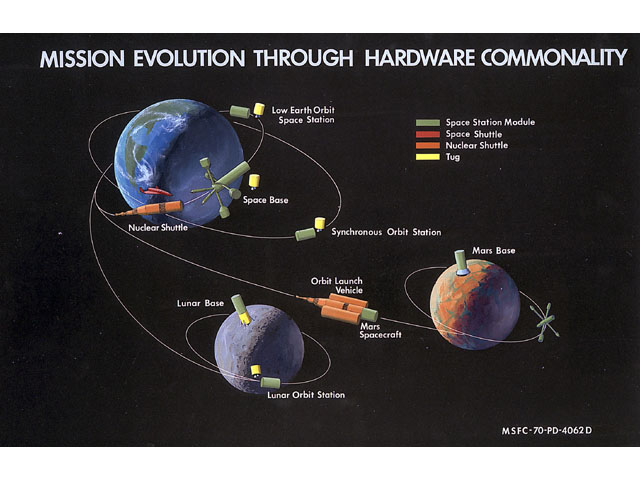
Reusable Nuclear Shuttle
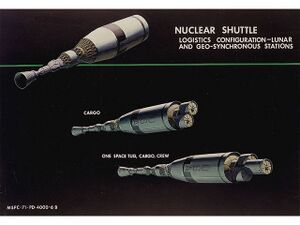
One of the 'backbones' of the Integrated Manned Program was the Reusable Nuclear Shuttle(RNS), a NERVA based propulsion stage that could be used either to shuttle cargo between Earth and Moon, or to send men to Mars and Venus.
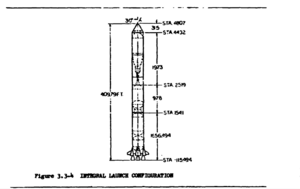
They were to be launched into orbit either by using a Space Shuttle and Saturn INT-21 to send it up as components to be assembled in orbit, or by using an Saturn INT-21 to place the entire spacecraft in Earth orbit.
See:
- Nuclear Shuttle System Definition Study. Phase III, Volume 1 Executive Summary
- Nuclear Shuttle System Definition Study. Phase III, Volume 2 Concept and feasibility analysis. Part A Class 1 Hybrid RNS. Book 1 System analysis and operations
- Nuclear Shuttle System Definition Study. Phase III, volume 2 Concept and feasibility analysis. Part A Class 1 Hybrid RNS. Book 2 System definition
- Nuclear Shuttle System Definition Study. Phase III, Volume 7 - RNS project requirements
Space Shuttle (ILRVS)
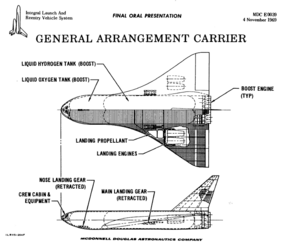
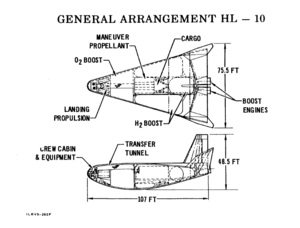
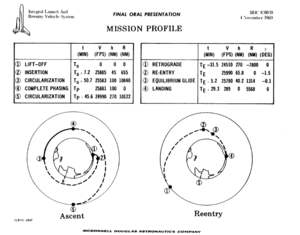
Another 'backbone' of the Integrated Manned Program was the Space Shuttle, a fully or parially reusable spacecraft designed to carry men and equipment to the various low Earth orbit spacestations that would be built as the program got under way.
Several different designs were considered before settling on the one currently being phased out. One such design was one proposed by McDonnell Douglas in which an enlarged HL-10 lifing body would be used to carry a 11,000kg (25,000lb), 4.6m(15ft) by 9.1m (30ft) payload into an orbit with a maximum altitude of 500km (270nm).
Called the Integrated Launch and Reentry Vehicle System (ILRVS), the shuttle and its two man crew would have been launched into orbit using a manned booster stage.
See:
References
Here are a selection of documents with information on the Integrated Manned Programme:
- North American/Rockwell, Technological Requirements Common to Manned Planetary Missions, December 7, 1967
- Boeing, Integrated Manned Interplanetary Spacecraft Concept Definition, Final Report Vol.1, Summary, January, 1968
- Boeing, Integrated Manned Interplanetary Spacecraft Concept Definition, Final Report Vol.2, System Assessment & Sensitivities, January, 1968
- Boeing, Integrated Manned Interplanetary Spacecraft Concept Definition, Final Report Vol.3(a), Systems Analysis (Missions & Operations), January, 1968
- Boeing, Integrated Manned Interplanetary Spacecraft Concept Definition, Final Report Vol.3(b), Systems Analysis (Experiment Program), January, 1968
- Boeing, Integrated Manned Interplanetary Spacecraft Concept Definition, Final Report Vol.4, System Definition, January, 1968
- Boeing, Integrated Manned Interplanetary Spacecraft Concept Definition, Final Report Vol.5, Plans & Costs, January, 1968
- Boeing, Integrated Manned Interplanetary Spacecraft Concept Definition, Final Report Vol.6, Cost Effective Subsystem Selection & Evolutionary Development, January, 1968
- J.P. Downs, W.B Thompson, A Feasible Planetary Exploration Program Through 1980, February 26, 1968
- Integral Launch and Reentry Vehicle System. Executive Summary Report, 1969
- Integral Launch And Reentry Vehicle System. Vol. 1, Configuration Design and Subsystems. Bk. 1, 1969
- Integral Launch and Reentry Vehicle System. Vol. 2, Performance, Aerodynamics, Mission and Operations., 1969
- Integral Launch and Reentry Vehicle System. Vol. 2, Technology Identification Final Report, 1969
- Integral Launch and Reentry Vehicle System Vol. 3, Plans, Costs, Schedules, Technologies., 1969
- Integral Launch and Reentry Vehicle System Vol. 4, One and a half stage configurations.
- Integral Launch and Reentry Vehicle System. Final Oral Report, 1969
- A.E. Marks Rationale for selection of a 50000 pound propulsion module in an integrated manned space flight program, July 7, 1969
- W.B. Thompson, Integrated Space Program: Manned Planetary Missions for the 1980's, August 6, 1969
- E.M. Grenning Integrated manned space flight program traffic model, June 4, 1970
- T.H. Sharpe, G. Von Tiesenhausen, Space flight evolution, June 30, 1970
- Nuclear Shuttle System Definition Study. Phase III, Volume 1 Executive Summary, May 1, 1971
- Nuclear Shuttle System Definition Study. Phase III, Volume 2 Concept and feasibility analysis. Part A Class 1 Hybrid RNS. Book 1 System analysis and operations, May 1, 1971
- Nuclear Shuttle System Definition Study. Phase III, volume 2 Concept and feasibility analysis. Part A Class 1 Hybrid RNS. Book 2 System definition, May 1, 1971
- Nuclear Shuttle System Definition Study. Phase III, Volume 7 - RNS project requirements, May 1, 1971
- Altair VI, Integrated Manned Space Flight Program, March 14, 2008